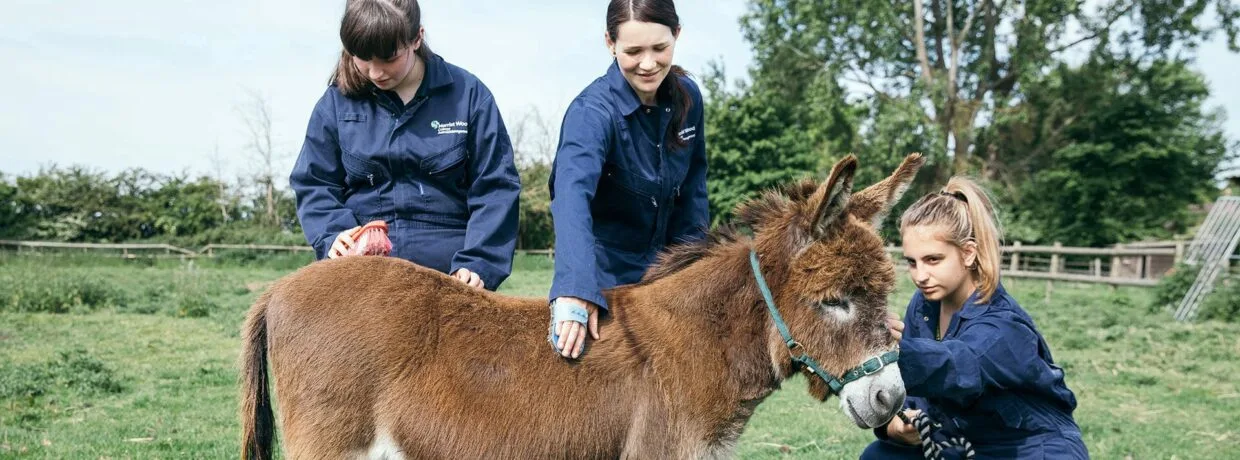
Animal Management
Overview
The Animal Management course will teach students how to care for animals responsibly and safely, including understanding their health and behaviour and creating environments where they feel safe.
It focuses on animal health, behaviour, welfare, nutrition, and biodiversity and often offers access to animal care facilities, wildlife parks, and practical placements in zoos, veterinary clinics, or conservation organisations.
Objectives
- Understanding Animal Biology and Behaviour
- Promoting Animal Welfare and Ethics
- Acquire Animal Care Skills
- Understand the importance of biodiversity
- Gain insight into laws, policies, and regulations related to animal care
- Build industry networks
Prerequisites
- Relevant Experience
- A high school diploma
- English language proficiency
Curriculum Outline
- Professional Skills for the Animal Industry
- Animal Biology
- Ethics of Animal Use
- Human-Animal Interaction
- Animal Husbandry
- Ecology and Evolution
- Research Methods
- Commercial and Professional Skills for Animal Science
- Behaviour
- Animal Health and Welfare
- Principles of Animal Nutrition
- Reproduction and Breeding
- Livestock Production Systems
- Management of Zoo Animal Collections
- Professional Practice and Legislation
- Veterinary Microbiology and Parasitology
- Animal Rescue, Rehabilitation and Rehoming
- Livestock from Farm to Fork
- Wildlife Conservation Skills
- Applied Behaviour and Training
- Veterinary Immunology
- Capstone Project
- Applied Nutrition and Feeding
- Applied Health Management
- Strategies and Issues in Animal Breeding
- Applied Behaviour and Animal Welfare
- Livestock Technology
- Applied Issues in Wildlife Conservation
- Clinical Animal Behaviour
- Veterinary Epidemiology and Public Health
- Developments in Livestock Production
- Developments in Zoo Management
- Developing Clinical Practice
- Veterinary Ethics and Legislation
- Conservation Planning and Development
Teaching Method
- Guest lectures
- Practical Hands-On Training
- Physical visit
- Classes
- Lectures
- Laboratory Classes
Modules
- Animal Anatomy and Physiology
- Animal Health and Welfare
- Animal Behaviour and Psychology
- Nutrition and Feeding
- Biodiversity and Conservation
- Wildlife Management
- Animal Husbandry
- Exotic Animal Care
- Animal Breeding and Genetics
- Animal Law and Ethics
Assessment Methods
- Examinations
- Practical Examinations
- Written Essays
Course Duration
It typically takes 3 to 4 years when you study full-time. Some accelerated programmes can take 2 to 3 years. The part-time or online programmes can span 3 to 6 years.
Facilities
- Animal Care Centres
- Reptile and Aquatic Units
- Aviaries
- Access to farm animals
- Equestrian Centres
- Wildlife Parks and Nature Reserves
- Habitat Simulation Areas
- Diagnostics Labs
- Bioscience Labs
- Veterinary Clinics
- Behavioural Observation Rooms
- Breeding Facilities
- Online Resources
Career Pathways
- Animal Care Worker
- Zoo Keeper
- Animal Welfare Officer
- Veterinary Technician
- Animal Health Inspector
- Wildlife Conservationist
- Habitat Manager
- Wildlife Rehabilitator
- Animal Behaviorist
- Environmental Educator
- Marine Biologist
- Equine Manager
- Animal Welfare Consultant
Fees and Fundings
The fee range for an Animal Management degree in the UK for international students can be between £13,000 and £20,000 per annum. The amount can vary by location and institution.
Entry Requirements
- A high school diploma or equivalent
- English language proficiency
- Personal statement
- References/Recommendations (Tentative)
Field Work and Internships
- Wildlife Observation
- Habitat Management
- Ecological Surveys
- Zoo and Wildlife Park Internships
- Veterinary Clinics and Animal Shelters
- Conservation and Research Roles
Certifications
- City & Guilds Level 2 and 3 Diplomas in Animal Care
- Certified Animal Welfare Administrator (CAWA)
- RSPCA Level 3 Certificate in Animal Welfare
- Veterinary Nursing Qualifications
- Animal First Aid Certification
- Wildlife Rehabilitation Certifications
- International Society of Arboriculture
- Environmental Management Certifications
- Exotic Animal Care Certifications
- Animal Behaviorist Certification
Intakes
In the UK, the primary intake happens in September/October, but students can always aim for the secondary intake, which takes place in January/February.
Student Testimony
‘The staff, from various animal industry sectors, provided incredible support and encouragement. Puxton Park's facilities allowed for both theory and practical work. Guest lectures and placements, like at North Somerset Birds of Prey Centre, offered invaluable industry insights.’ [Declan from Weston College]
Frequently asked questions
Animal management focuses on the care, welfare, and husbandry of animals, where you can learn about animal behaviour, health, nutrition, breeding, and genetics.
